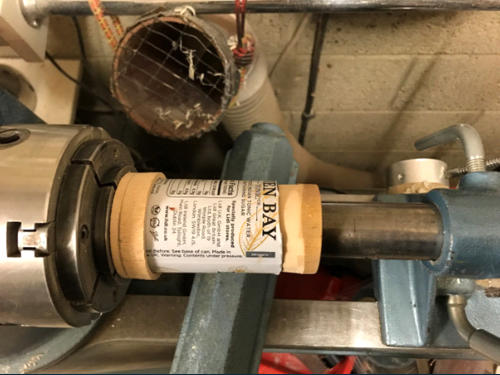Using HDPE to make live centre adapters
By our Secretary, Peter Hatherell
There are occasions when you need live centre support but don’t want to mark the wood with the point
of the standard 60° live centre. You can use high density polyethylene (HDPE), which is a widely available
plastic that we usually dump in the recycling bin to make adapters for your live centre. Look for the
recycling symbol as above, usually on the underside of the container or plastic item.
HDPE can easily be melted in a domestic oven, set at 150°C, or thereabouts (ovens vary). Chop the plastic up
into smaller pieces and place on a roasting tin lined with reusable non-stick baking parchment
(eg lakeland.co.uk/3318/magic-non-stick- oven-liner-standard-50-x-50cm). Using silicone oven gloves, the plastic,
once melted, can be rolled up into a ball of putty-like material. Add more plastic as necessary to make up the
required volume.
Pack the soft plastic into a mould. I use small tonic water tins with the top cut off because they are about the
sort of size I usually want but you can use whatever size (and shape) mould you like. Compress using a piece
of suitably sized wood. You can do this on the lathe using the tail stock as a press. If the plastic has cooled too
much, return the tin to the oven for a few more minutes. Once re-softened, again use the lathe to push your live
centre into the plastic. Leave to cool, then remove from the mould.
This should leave you with a cylinder of plastic with a conical depression in one end. This should be an exact fit to
the live centre. Fit the plastic over the live centre and push onto a spur drive, allowing you to turn it and tidy up
the live centre end, then turn a tenon there. Reverse the cylinder into your chuck and profile the solid end to your
desired shape. HDPE is very easy to turn. You can now use the adapter over the live centre as required. If it doesn’t
turn out as you wish or if you no longer need that particular profile, it is easily reshaped on the lathe or can be re-
melted for another adapter.

CLICK HERE to return to the News Page


























